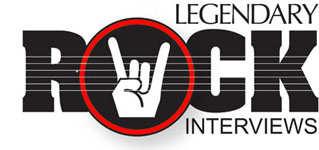Kiss Kontributor and Studio/Guitar Guru Bob Kulick: ” I remember thinking… Is there anybody who could really think thats Ace playing, Really??”
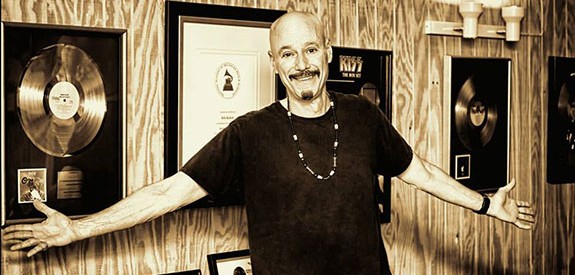
Bob Kulick, like his younger brother Bruce, has made a lifetime out of his love for music. Bob is currently a sought after producer and studio owner along with engineer/co-owner Brett Chassen at Office Studios in L.A. but his musical past stretches back decades. Kulick’s resume includes involvements with some of the rock music’s biggest acts including (but not at all limited to) KISS, Alice Cooper, W.A.S.P., Meatloaf and many more. I had plenty to ask Bob about his past with those bands but we also spoke about his studio, tribute album work and the state of the industry as well, read on…..
Legendary Rock Interviews: Thanks for talking with us Bob, I wanted to start by asking you about your experience with Jimi Hendrix, how did that come about?
Bob: Yes, one of the bands that I played with early, early, early on as a kid played at a place called Café Wha in Greenwich Village and Jimmy James, as Hendrix was known then, basically had the job there at the club so we checked them out and got to hang with him, chat with him, learn from him and have a real experience with someone who obviously was going to be a big star. It was an amazing experience.
LRI: So you could already see greatness even at that point?
Bob: Oh it was so obvious, it was as obvious as a spaceship landing and we all just stood there with our mouth hanging open like “What’s that?”, “How do you do THAT?”, you know…It was just ridiculous, the guy was already a consummate performer, playing his ass off, playing guitar with his teeth while we were playing with our hands, there was no contest, we all just surrendered because of the vibe, it was like “Ok, you rule!” (laughs).
LRI: You’ve done plenty of interviews talking about KISS and just like your brother have had that position on the inside with the band for so long and known the guys before they were even famous that I was wondering if you ever felt like “This is crazy, all this adoration and attention lavished on Gene and Paul”?
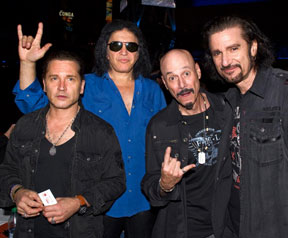
Eric Singer, Gene Simmons, Bob Kulick and Bruce Kulick!!
Bob: No, in fact it’s just the opposite. I think back to when Gene, Eric Singer and my brother played at the Oktoberfest that they have at the Staples Center, Gene whispered in my ear “Me, you and Bruce, no one will be able to touch us!” so there’s a respect amongst us as musicians and no one has ever felt like just because they might have more money or be considered a superstar that they were better than us, he was acknowledging the presence of two people who make him look great and he was consistently doing so that night as he always does.
LRI: I think I’ve read plenty about how you came to play on the “Alive 2” tracks but I wanted to ask you about your experience playing on the “Killers” album. How did you see your role on that album?
Bob: Well, I was the ‘designated hitter’ wasn’t I? That was me. For KISS Alive 2, it was Bob, for Paul’s album, it was Bob, for KISS Killers, it was Bob so I guess it was just the natural thing to go and ask me to play on it. It was just what it was, I was the favorite at the time.
LRI: As a KISS diehard I think it was always obvious that there was something a little different about those tracks on “Alive 2”, listening back now to your tracks there are some obvious differences between yours and Ace’s guitar style, do you have an opinion on that all these years later?
Bob: Well, we do not sound exactly alike. There’s a nuance lost on most people but to the schooled ear you can definitely hear that was not his pick attack and you could definitely hear that certain note choices were definitely not something that he would have played. That’s not to say it’s better or worse but just that it is what it is. We tried to make it close and we did but we could have been way more of sticklers, I would have been. I mean, I’ve played stuff where Gene stopped me after one note at one point and was like “That! He wouldn’t play that note” and I was like “Ok, I’ll just start at some place else”. I remember that CLEARLY but yet they let some of what is on there slide. “Do you really think he could play that, do you really think he would play that?’, I remember a lot of that clearly.
LRI: I like those tracks on Alive 2 but back to “Killers”. I really like those “new’ tracks on that album, did that material strike you or impress you from the get-go?
Bob: Well, “Nowhere To Run” for me was Paul Stanley. I mean, he just put down this kickass vocal on that track which made that, to me, this really standout track on that album. Even on the 89 tour, he just never did it, we rehearsed it but we never did it. It’s a great song but it’s just a hard song to sing.
LRI: My favorite is “I’m a Legend Tonight” and your playing on it is nothing short of phenomenal. Any thoughts on that one?
Bob: That’s a killer tune and I remember thinking “Is there anybody who could really think that’s Ace playing?….really?” (laughs) but they let that totally slide because it just blew them away.
LRI: When working with the band in the studio did you feel less and less confined or constrained as far as feeling like you were your own player or knowing what they wanted?
Bob: (laughs) No, it probably got worse as it went, they became more and more fussy which is kind of why the train ran off the tracks and I ended up steering them towards my brother because it became like “Ok, what else we got??” and I was like “What else we got??, what am I, a shoe salesman?….well I’ve got these pumps I could try on” (laughs). I was like “Ok, I could try a different approach I guess” and they’re like “What else ya got?” (laughs). I guess familiarity breeds contempt and then there was the frustration of whether or not it sounded like Ace or Paul’s style of playing, it eventually led to me suggesting my brother.
- Bob Kulick live onstage, photo by Julie Bergonz
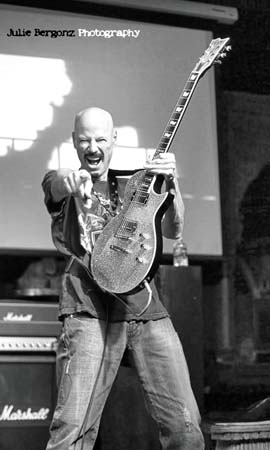
Bob Kulick live onstage, photo by Julie Bergonz
LRI: You are of course famous for being on the Meatloaf “Bat Out of Hell” tour in 1977 but prior to that you had a stint playing with one of my other favorite acts Alice Cooper in March, 1977 and filling in for the great Steve Hunter, how was that?
Bob: It was the Australia/New Zealand tour. I was asked to jump in the pool and have a GREAT time under super circumstances . I had never been there before, number one album, stadium gigs, it was so much fun it was unbelievable, just a great, great time.
LRI: I know you’re a total professional but I would have a tough time focusing on my parts and not just wanting to enjoy that classic show. What went through your mind onstage?
Bob: I was a professional but “I can’t believe I am playing with Alice” did go through my head, I did have that thought. At the time, he was a raging alcoholic so there was no conversation about hang-outs or “Yeah, let’s go shoot the shit after the gig” or any of that (laughs). It was literally just, you show up for the shows and there he was like “Hi” and I was like “Hi” and it was so bad because many years later I would ask him about certain things from that time and be like “You don’t remember that show” and Alice was like “Noooooo! I don’t remember” and I was like “Are you serious?” and he said “No, I don’t remember that TOUR Bob!” and I am thinking “Wow, so that’s how drunk he was “.
LRI: And working with Dick Wagner had to be amazing, he’s a really great guy and a big supporter of yours…
Bob: Obviously, he’s a world class player, world class songwriter and performer and he was just utterly plugged in and I’m a big fan of his going into that gig, we had bonded a bit from doing various sessions for various albums and he was just like “Yeah, why don’t you come and play with me and Alice because he’s gonna be doing these gigs?” and I was like “Are you SERIOUS???!!” and he was like “Yeah!! Just learn Steve’s parts and you’ll get to go”. So I did show up totally prepared, absolutely totally prepared and I do recall Alice showed up and was watching rehearsals and was sitting there yelling out “Dick, the guitar player’s GOOD” and Dick’s like “He’s talking about you Bob, say hi to Bob, Alice” and Alice yells out “Hi Bob” and I yell back “Hi, Alice!!” (laughs).
LRI: You worked on a great deal of the Crimson Idol record for W.A.S.P., are we hearing a lot of your playing on that album when we revisit it?
Bob: Boy, I don’t know. I may be guilty as charged (laughs). I know I’m on the big solo on “The Idol” and “Chainsaw Charlie” and all of that, that was me, Blackie may have used a lot of my stuff there and I’m not real clear on the song titles or any of that as I’m talking to you, it’s all very vague to me because it all took wayyy too long and was all slaved over wayyy too long and that’s not my style. I’m a kind of spontaneous “get it done” kinda guy. I commit….as in, “That’s it, that’s the vocal” or “that’s the solo, that’s it, that’s the track” but that was NOT the way that record was recorded at all so it all just wound up blurring in my mind to be honest. There were some good pieces on there but it was just totally excessive, totally excessive and overworked, in my opinion but definitely some great material including “The Idol”. That was like a Pink Floyd piece, a really well-conceived tune. Blackie sings his butt off, there is NO question about that, if he could just SHUT UP and listen to anybody, the guy is super talented and could be a frontman for any band really. That’s how good he is, he’s a giant and he can sing his butt off but as far as him being a producer or guitar player or bass player, leave that to guys who can really play. That was what was wrong with that whole thing. I guarantee you that if I had played all the guitars on that record it would have sounded like something serious.
LRI: So you are pretty sure you are not the only player on that album?
Bob: I don’t recall. I know Doug Aldrich played one of the solos on “Crimson Idol” which one I couldn’t tell you but it was definitely Doug Aldrich no matter what they say on the liner notes. It’s so long ago I confess to being a little blurry on that or absentminded on that stuff. I didn’t take myself THAT seriously like that. Certain things I know for a fact and then other things I don’t recall because they just weren’t a great experience for me and I don’t wanna say that in any way, shape or form to denigrate him, I have all the respect in the world for Blackie Lawless, he’s a super talented guy but that just was not a great experience for me so I was like there and gone.

LRI: If I remember right, Blackie had asked you to join the band, correct?
Bob: Yeah but it was one of those things where you’d have to be stuck with playing note-for note solos and it just changes the whole relationship of things to where it’s like “Ok, now they’ve hired me to be in this band and I’m one of the band members” and it just didn’t feel right. I just thought, “You know what? You’re gonna be miserable, don’t do it.”
LRI: Do you consider yourself more of a creative insider studio guy than an onstage performer?
Bob: No, actually I have a total blast playing live, I really enjoy it. I wish I could do it more often but it has to be the right circumstances. It really depends on who it is and what it’s for. I did a gig with Dee Snider in Vegas that was a total blast, the band kicked ass and Dee was amazing and it was one of the best experiences, one of the most fun nights of my life, my feet never touched the ground it was pure magic, so it’s all about who it is and what it’s for.
LRI: My kids may not realize it but they are big fans of Bob Kulick. You played a huge role in both Triple H’s song for the WWE and also “Sweet Victory” from Spongebob Squarepants right?
Bob: David Eisley (Guiffria frontman) and I wrote “Sweet Victory” and I play all the guitars on “Sweet Victory”. The Spongebob people heard it, built an episode around it and stuffed most of the song in there and poof the thing totally exploded. We were laughing our butts off when they put it on the record and the downloads alone were 300,000. 300,000 people downloaded 3:14 of that song (laughs). That’s a lot and it was very successful and the Triple H thing was just something that fell in my lap. That was something I had for a long time and just kind of forgot about and then all of a sudden it was in my lap and I was like “Triple H, let’s see what he looks like….Yikes, look at this guy, he’s like frightening, what do I do with this?”. Motorhead came in and they gave a half-hearted performance, he sang half the song basically and they left and my partner and I looked at each other immediately and said “Ok, first of all the guitars are not gonna cut it, let’s redo the guitars so we redid all of the guitars except for the lead guitar and it needed something still, there was a whole span of time where nothing was happening there so we came up with that two-note thing that you here that he spits the water out to and we moved the rest of the verses and pieces around and created a song. If you listen, the laughs on the track are the same, the laugh in the front is the same as the laugh at the end, why? Because it’s the same laugh! Having said that, when it was done, that was one of the few things that I knew for sure it was a homerun, out of the park, see ya. Stephanie McMahon, Triple H’s wife, told me to my face that he cried when he heard it and it made all the other wrestlers jealous (laughs). That was actually my introduction to Chris Jericho as well who I’ve worked with since, in fact he’s on the Michael Jackson Metal album that I produced.
LRI: The album is called “Thriller- A Metal Tribute to Michael Jackson” and I know it features all kinds of people from members of Testament and Motorhead to GNR to King’s X and Living Colour paying tribute to MJ, what did Jericho do?
Bob: Chris did “Dirty Diana” and did a great, great job on it. Lajon from Sevendust is also on there doing “Black Or White” which is great. It was a really interesting project to work on because the songs are so iconic and amazing and we just put these totally different spins on them. These guys are dishing this stuff out with tuned down guitars and some really different sounds than you are expecting, I think it is totally kick ass. It was a challenge and a lot of rock people will not admit they are Michael Jackson fans but they all know this material and know these are great songs.
LRI: Your production on the Metallica tribute album resulted in Motorhead winning a Grammy which is of course pretty prestigious. How did it feel to get that recognition?
Bob: It felt gratifying “calling it” so to speak. When I said “They’re gonna win” I was laughed at. The manager even called and was like “Why are you telling them they’re gonna win?!!” and I said “Am I not entitled to my opinion?” (laughs) and they’re like “Slipknot’s gonna win, so and so’s gonna win” and I said “They’re not, they’re just not. I am telling you right now they will all cancel each other out and Motorhead will win”. Sure enough, it quickly became, “How did you know??!!” and I just said “A little birdy told me” (laughs). Sometimes you just have a feeling, you just know when something is gonna happen.
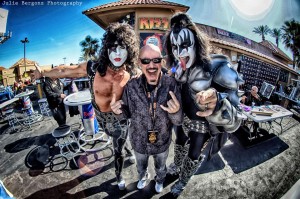
Bob with members of Sin City KISS at the KISS Monster Mini Golf in Vegas
LRI: I have to ask you of all people about the current state of the record biz. There are more records than ever being released and I can hardly keep track of them all and some of it is due to the fact that recording has never been easier with protools and home studios and bands that don’t even get in the same room together and just make albums by sending files back and forth. The labels accept it and sometimes the public doesn’t seem to know the difference. You have a professional studio, The Office, and obviously a professional background. Aside from having that seasoned producer or engineer can you think of other reasons why people should use a pro studio rather than a PC or home studio?
Bob: Oh god yes. I think recording at home is a bad way to go always because you’re never gonna know or give your best performance. Part of it is that you are never going to have the right vibe or environment to really focus on what you are doing like you do here at the studio. It just makes it better, it always does. Some people will say, “I can get the same sound with blah blah” but the thing is that sound is only one component. Sound is one thing but you’re never gonna get that great performance of that great song, that great vocal, that great solo track, even great lyrics… that’s all magic and that’s part of what we do at the studio.
LRI: Is it easier for more seasoned pros that have experience in the real studios to pull it off at home sending tracks back and forth via email than it is for the baby bands who need more finesse? It would seem like the baby bands who think they have it made with all this technology suffer the most from the lack of a pro setting.
Bob: Again, making a killer album requires having a hit song and having a hit song requires a whole lot of things. If you wanna graduate to be with the big boys you have to compete on their level, that’s the most difficult part and like you reference, the young bands do suffer the most because if they can’t find something within them that is true and memorable, that’s going to stick, then nobody, I mean nobody’s going to pay attention. You can do it by sending your vocal track to your drummer and having him send back a track and then putting down a guitar track, you absolutely can do it, it’s a whole new world and it’s very easy to do that but the easiest way is generally not the best way of doing things. We have got our studio set up to be an effective and enjoyable place to create, it’s our own romper room. We had a band come in to record from Australia who didn’t bring ANYTHING, they didn’t bring a thing because we have everything, we have tons of drums, tons of guitars and amps, it is designed for musicians to be a musician’s paradise.
LRI: Good segue, I wanted to ask you about my friend Margarita Monet’s band Edge of Paradise who you produced recently on their EP “Perfect Shade Of Black”. I think they are great and thought so the first time I heard them, Margarita has a very unique voice and approach and Dave is a killer guitar player, how did you get involved with them?
Bob: I knew Dave (Bates, Edge of Paradise guitarist) in a previous incarnation, back in the day. He came out to our studio a couple of times and then it was like “Well, what do you think about working with us?” and it was like “Perfect” because the timing was just perfect. So, we hit it off again and we had a lot of fun making some really cool music. He and Margarita are a great pair to work with and the band has a really cool sound. Their material was very, very well thought out, great music, great lyrics and Dave is a very, very meticulous worker and she sings her butt off in addition to being a great keyboard player, as a band they are a great combo platter.
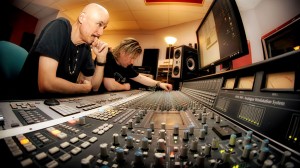
Bob and Office Studios co-owner/co-producer Brett Chassen, photo by Julie Bergonz
Bob and his partner Brett Chassen photo by Julie Bergonz
LRI: Thanks again for your time Bob, before I let you go, your brother gave me a great interview a couple years ago and mentioned that recording/releasing something with you was on his “bucket list”. I realize you guys are both busy with many other things but Is there any movement towards that?
Bob: Yes, maybe not a whole record but perhaps an EP is something we have talked about. We have some of the songs written already, some tracks that are already recorded but needed to be finished and some songs that still needed to be finished writing. It’s possible, entirely possible that it might just come out as an EP hopefully sooner than later.
LRI: Other than the one-off conventions have there been opportunities for you guys to get out there and do some live dates together in between your work at the Office and his work with Grand Funk?
Bob: That’s what we have talked about, it would be nice to have something out before we did something like that but I know the fans would enjoy it as much as we would.
Check out Bob Kulick and Brett Chassen’s Office Studios here
Category: Interviews
